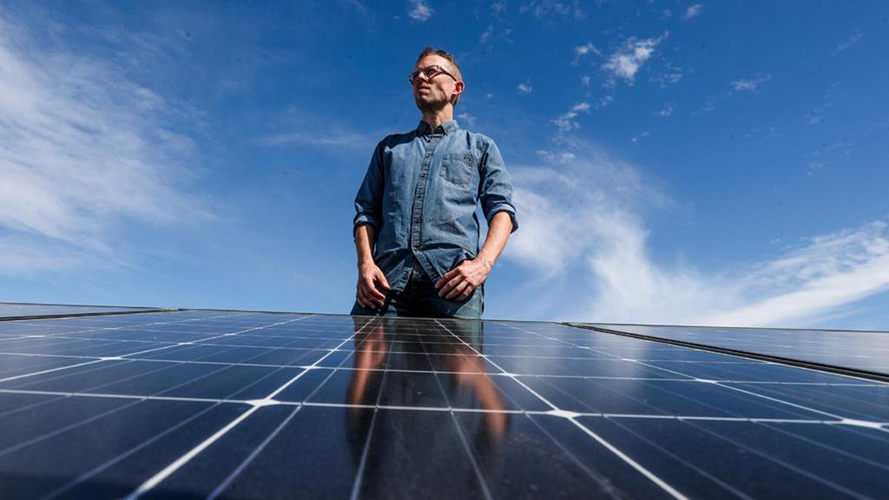Summary
My guest on the show today is Finn Peacock from SolarQuotes.com.au. Finn is an electrical engineer with a passion for renewable energy that led him to create a business dedicated to helping people bring solar energy into their homes. Finn started the SolarQuotes company in 2009 and is an expert on retail domestic solar systems and renewable energy.
Some of the topics in today’s episode include:
- Finn’s backstory and how he ended up getting involved with solar energy.
- What to think about if you’re considering buying a solar system for your home.
- How does a solar system actually save you money?
- How to decide what size solar system is right for your home and how to calculate the payback period.
- Common mistakes people make when choosing a solar system.
- Where does Finn see the future of sustainable energy heading?
Links
Transcript:
Heads up grammar police, the following transcription is half human half machine and not 100% perfect so expect a few typos and errors…
Coming soon








Great interview. I love the work that Finn is doing. I read all his stuff on his website, but consuming the information through a Podcast and have you ask the questions we all like to ask. I have been holding out for a battery, but I’m thinking now just go solar and go large.
Thanks Greg. I’m glad you enjoyed the pod 🙂
Fantastic interview, by someone that knows what his stuff. I have been reading through his web site and will go through it when I start to build a house in six months or so.
Very interesting podcast. Thank you!
We had solar put on our roof about 2.5 years ago. We have a 12.?kw system with a 10kw inverter. It’s fantastic. We still have a decent feed in tariff although it has come down once already in that time.
As an example, we produce about 1100-1200kwh/month in winter, and 1800-2000kwh/month in summer. We only use 20-30% of the power we produce, on average, even though we have quite a large house with ducted air conditioning plus a pool. Our power bill has been in credit every month except 1 in that time. That month cost us $8 (solar production was lower due to smoke in the air and usage was higher because we used the air conditioning to keep the smoke out during the 2020 bushfires).
We wanted a battery too but it just wasn’t worth it cost wise. We’re hoping we can get a battery whenever the inverter dies (10 year warranty but hopefully it will last longer than that). Fingers crossed they’ll be economically viable by then!
Some more information for anyone who may be interested:
We’ve had the system for 29 months so far.
We’ve produced 46MWh in that time, self-consuming about 24% (~11MWh) and exporting 35MWh to the grid.
We’ve consumed 20MWh in that time. About 55% of that was self-consumption, so we’ve bought 9MWh from the grid.
I don’t have all the $ figures to hand, but in the 20/21 FY, the feed in tariff credits from our exported solar power earned us enough to cover the daily supply charge, all the electricity we bought from the grid plus generated almost $1,800 in credits which is paid out as cash.
I think our FiT is currently 21c/kWh, because the great plan we signed up for a while ago hasn’t expired yet. It’s not available anymore. I’m sure the FiT will come down soon enough, and then so will our cash in hand profits, but hopefully we can still earn enough to keep our monthly bills in credit.
One thing I didn’t hear mentioned (and maybe it was in there and I was just distracted at the time) was that the direction your roof faces plays a significant factor in how much power your panels will produce. I believe south facing are the worst.
Maybe that sort of advice is not the purpose of this product – the companies providing the quotes should be telling you that, but it’s worth knowing.
Our panels are roughly NE and NW facing so we get good power generation all day.
Hi Miranda, I cover that here (TLDR it makes less difference than you may think): https://www.solarquotes.com.au/panels/direction/
Thanks Finn! Hands down the best solar educator on the internet, and a fellow south Aussie at that!
Great podcast. Solarquotes is a very informative and helpful site. Finn is the GOAT!
Good podcast. I was wondering though if you had any insight for people renting their home. I guess there’s not much that can be done, but do wonder if it could be economical to install and then remove panels every few years when you move home. Or perhaps someone out there is tackling this problem with a more innovative solution?
Solar for rentals is a really hard one. it is not viable to relocate rooftop solar panels – so you are dependant on the landlord putting up some cash for the install. Unfortunately, most landlords want to spend as little as possible on their rental properties.
Lots of things have been tried:
1) installing solar with a special meter that lets the landlord bill the tenants for solar electricity at a reduced rate, [aying off the installation investment for the landlord and delivering saving to the tenants. Almost no landlords were interested!
2) Various state government schemes for landlords – rebates, cheap loans, etc. Again – not much interest from landlords.
I personally think the solution will eventually be plug and play batteries that the tenants take with them, combines with a cheap retail tariff that offers very cheap electricity during solar hours (called a solar sponge tariff). This will require cheaper batteries, a clever plug-and-play battery design, new standards for switch boards and solar sponge tariffs across Australia – so don’t hold your breath.
Origin is currently offering solar PV systems through Woolworths email marketing, what does Finn think of their offer? I can send details of their quote if you don’t know anything about it.
The reputation of Origin in terms of install quality and customer service is generally poor. I’m not a fan. I suspect you can do better with a good local installer.
Hey Finn, what are the chances of getting some updated information about Solar Hot Water Diverters. As feed-in tariffs drop, I’m looking for a better way to self-consume. I have solar hot water, but it only provides 100% of our hot water needs for around 4-5 months of the year. Currently I’m banking the summer solar as a bill credit, and drawing it down in winter (single rate, no controlled load). The difference between the feed-in rate and consumption rate basically equates to having off-peak anyway, but I feel that party is going to be over soon.
Yes – I am planning an update. My favourite is the Green Catch. Unless you already have a Fronius or SolarEdge inverter – then it makes sense to use their own diverters. All the models I know of are here: https://www.solarquotes.com.au/hot-water/pv-diverters/
As soon as Finn mentioned Tony Seba (probably one of the smartest & most knowledgeable people in this area) & Teslas batteries being the best I knew immediately this guy knows what he is talking about.
The next decade or 2 is going to be very exciting & Tesla is going to disrupt a great many companies in the process. Full disclosure I am invested in Tesla & for good reason.
Thank you for bring Finn on the show and exploring install of solar systems with option for battery to save funds overtime.
Yes current and forward direction is renewables with community hubs to store and share power and grid to regulate excess/peak demands. I am with you on Tony Seba and Tesla.
Personally I went the retro way, installed solar hot water and served me well for 15 years yet expensive to replace. next installed 20 solar panels/inverter and sold some back to the grid – halved my electricity bills. Then installed a battery followed by electric car and charger -halved my costs again. Then got off the gas heating and hot water booster and upgraded to electrical systems and upgraded whitegood appliances for greater efficiency.- reduced costs by one-third. Now need more batteries as electricity usage has gone up overtime. Good advice from Finn around fill your roof with solar batteries as we electrify our lives will need bigger systems to take generate higher loads.
Really loved this one. I found Finn around a year ago when I was researching getting solar panels installed. I devoured Solar Quotes. The knowledge there is priceless.
I then got my three quotes, spoke to three great companies and had a hard time choosing which one. The one we settled on were brilliant. Couldn’t recommend highly enough. And the system is perfect. Tiny bills or tasty credits. On a recent winter day we generated 34kWh! Used barely any. Love QLD. That’s on a 6.6kW system with a 5kW inverter.
One thing not mentioned is a really simple one. If you have a traditional hot water system, make sure you get the solar installers to put a timer on it. Couple of hundred bucks. Set it to only run during the day. Even with a family of four and the hot water not being allowed to heat after 4pm, we never run out of hot water. On average hot water accounts for 30% of your bill. Make sure the sun is paying for it.
Thanks as always Finn and Firebug.
Interesting article, you can still add to it:
https://mysolarperks.com/hm-pow-sol-panel
Hi Finn,
We bought our house over 20 years ago. It already had a great pool with rooftop black solar matting/tubing which monopolizes all of our north and west facing roof space.
I would have got solar panels many years ago if the roof space was available.
Do you have any thoughts advice suggestions on this?
Hi Finn,
We bought our house over 20 years ago. It already had a great pool with rooftop black solar matting/tubing which monopolizes all of our north and west facing roof space.
I would have got solar panels many years ago if the roof space was available.
Do you have any thoughts advice suggestions on this?
Explore the limitless potential of solar energy with Finn Peacock on this enlightening podcast. Uncover insights, tips, and the latest trends in sustainable power. Tune in now!
Exploring the radiant world of solar energy with Finn Peacock on this enlightening podcast! A captivating journey into sustainable power. Tune in and embrace the solar revolution!